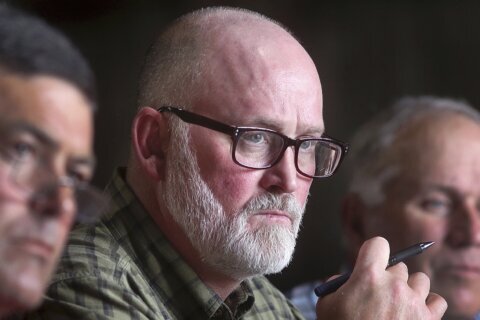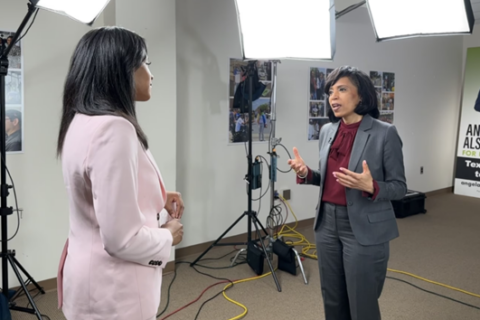When Republicans were down in 2021, after losing control of the White House and the Senate, Glenn Youngkin gave them hope with his victory in the Virginia governor’s race.
The question now for GOP voters is whether they see Youngkin as a rising star — and potential presidential nominee — or as an afterthought in a primary season that has seen former President Donald Trump and Florida Gov. Ron DeSantis corner most of the attention to date.
Like DeSantis, Youngkin has not yet announced his 2024 plans. Unlike the Florida governor, Youngkin has so far failed to register as a potential contender with the Republican grassroots and in polling. But in his CNN town hall on Thursday night, hosted by Jake Tapper and focused on public education, the governor had a rare opporltunity to make his case to a national audience in prime time.
Youngkin’s focus on education and “parents’ rights” during his 2021 campaign has been copied by Republicans around the country, many seeking to parlay anger over Covid-19 shutdowns into a broader backlash against public educators and administrators. Like Youngkin, they have also attempted to package cultural clashes over race and sexual identity as fights over the freedom of parents in educating their children.
But even as Youngkin treads the same terrain as Trump and DeSantis, he has mostly projected a sunnier disposition — a trait that could appeal to conservatives concerned that the current front-runners could be too divisive in a general election.
Here are some takeaways from Youngkin’s town hall on Thursday:
Youngkin defends executive order on ‘critical race theory’
Youngkin defended the executive order he signed last year banning “critical race theory” from being part of public school curriculum, arguing that children should not be taught that “they are inherently biased.”
Critical race theory is based on the premise that racism is systemic in American society and is not the simple result of individual prejudice. According to CRT, racism is baked into institutions, laws, and policies that create and maintains racial inequities.
The theory was not a part of Virginia’s standard of learning but has become a frequent target for Republican leaders seeking conservative grassroots support.
Youngkin said Thursday that his “critical race theory” executive order was less important than other directives, including one that states that slavery was the cause of the Civil War. (This had long been a point of debate among historians and political leaders but is considered by many to be a settled point.)
The executive order stated that “inherently divisive concepts, including critical race theory” should have no place in school curriculum. Youngkin’s administration later created a tipline for parents to report on teachers who allegedly disobeyed it. (The system has since been shut down.)
Schools, Youngkin said Thursday, should not “teach that a child is guilty for sins of the past because of their race or religion or their sex” or “that a child is a victim because of their race or religion or their sex.” CRT, he argues, suggests just that.
“CRT isn’t a class that’s taught,” he added. “It’s a philosophy that’s incorporated in the curriculum.”
Pressed by Tapper on how, under these constraints, teachers can explain that the present is a product of the past, Youngkin demurred.
“We must teach all that,” the governor said, before pivoting to a criticism of “today’s world of equal outcomes for all students at any cost.”
Youngkin on transgender policies: What’s so controversial?
Youngkin has pushed a raft of new policies focused on transgender students.
His administration’s guidelines include a ban on trans students using bathrooms or competing on sports teams that do not match their sex assigned at birth. He has also required that parents sign off on the use of a gender pronoun different from what appears in a student’s school record, among other similar steps.
But in his CNN town hall appearance, Youngkin tried to minimize the new rules, which have been met with a backlash from transgender and equal rights advocates, arguing that his only goal is to “accommodate” as many students as possible and to guarantee parents’ involvement in these “difficult decisions.”
“Sports are very clear. I don’t think it’s controversial. I don’t think that biological boys should be playing sports with biological girls,” Youngkin said. “There’s been decades of efforts in order to gain opportunities for women in sports, and it’s just not fair.”
On the issue of restrooms, Youngkin again parried and pointed to past statements in which he suggested that “we just need extra (gender neutral) bathrooms in schools.”
And pressed by Tapper about what do in instances in which parents are not supportive of their trans children, Youngkin instead pointed to parents who he said have been locked out of their children’s lives.
“Children belong to parents,” Youngkin said. “Not to the state, not to schools, not to bureaucrats, but to parents.”
Governor argues against new gun laws
Youngkin was questioned about what concrete measures Virginia is taking to protect students and staff following an incident earlier this year in Newport News, in which a 6-year-old boy allegedly shot his elementary school teacher.
The governor argued that Virginia needs to focus on improving mental health resources rather than strengthening gun laws — saying that the commonwealth already has some of the “toughest gun laws in the country.”
“What we continue to find is that those gun laws don’t keep us safe. Because it’s not laws that keep us safe. It’s the behavior of people that we need to make sure that we’re paying attention to. Parents have a responsibility to keep guns out of their young children’s hands, and they need to be held accountable for that,” Youngkin said.
He then pointed to the Covid-19 pandemic’s toll on children’s mental health and said it was important that Virginia move forward with an “aggressive transformation” of its behavioral health system.
Asked if he would strengthen the state’s red flag law or require a safe storage measure, Youngkin said that Virginia already has such a measure in place and that requirements exist for parents to restrict access to firearms for children.
“The reality is, if people don’t follow the law, then the laws aren’t as powerful as they otherwise could be,” he argued.
More schools should ban ChatGPT, governor says
Youngkin said more Virginia schools should ban students and teachers from using ChatGPT, an AI-powered chatbot tool that could make it easier for students to cheat.
“I do think it’s something to be very careful of, and I think more school districts should ban it,” he told Tapper.
Earlier this year, Fairfax County public schools in northern Virginia blocked ChatGPT from county-issued devices, according to WTOP News.
School districts in New York City, Seattle and Los Angeles have also banned students and teachers from using ChatGPT on district networks and devices.
The tool generates convincing responses and essays in response to user prompts.
“I think we should just be clear about what our goal of education is, which is to make sure that our kids can think,” Youngkin said. “And therefore, if a machine is thinking for them, then we’re not accomplishing our goal.”
This story has been updated with additional information.
The-CNN-Wire
™ & © 2023 Cable News Network, Inc., a Warner Bros. Discovery Company. All rights reserved.







